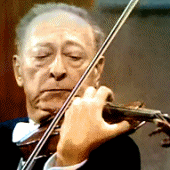![]()
|
THE BEST HOT DOGS, THE BEST
BELUGA: by Schuyler Chapin COPYRIGHT 1988 National Review, Inc. ON DECEMBER 10, 1987, Jascha Heifetz died at the age of 86. Newspapers reported his death on the front page; good-music stations interrupted regular programming to play his recordings. Even Dan Rather, Tom Brokaw, and Peter Jennings headlined their obituaries of him. Heifetz's death was big news. Why? Because he was the greatest violinist of the century; many knowledgeable critics believe he was the greatest since the instrument was invented. There were leitmotifs, in those obituaries, about his demanding character, his personal aloofness, his impeccably formal stage demeanor that never revealed a trace of passion. About his greatness, there is no argument; about his aloofness and lack of passion--well, perhaps. I criss-crossed the country with him for three years as his tour manager. No man is a hero to his valet, if he has one; no artist a secret to his tour manager, if he has one of those. Heifetz had, because for years he was the biggest box-office attraction in the entire musical world. We began our association on a Union Pacific train from Los Angeles to Salt Lake City. As we dined, he went over a list of dos and don'ts, including an admonition: I was never to tell him he had given a "nice concert." At Salt Lake, he played the Beethoven concerto with the Utah Symphony. I said nothing. From Salt Lake we went to Denver, where he played the Tchaikovsky with the Denver Orchestra. Again, I said nothing. Our third stop was Beaumont, Texas. After the concert we were waiting for supper when he turned to me. "Don't you like music?" he asked. "I love it!" was my quick reply. "But you never say anything." I reminded him of his remark. "Oh, well," he answered, "everyone likes to know if someone really enjoys a performance." He broke into a grin. Once, in New York, at a grand party after he played the Mendelssohn with the New York Philharmonic, I noticed a buffet table with only two dishes, enormous bowls of caviar, and platters of hot dogs. "My two favorite dishes," he exclaimed. "I never get enough. Of course, both must be the best." Brooks Smith, his last accompanist, played his first concert with Heifetz over twenty years ago in Syracuse, New York, during a blizzard. The program included the Richard Strauss sonata, a work Heifetz championed even though he was physically attacked for playing it once in Israel. When the sonata was finished, the two men embraced backstage before bowing, two musicians elated because they had made music together. I had to push them out to acknowledge the applause. Later we mushed our way to a train for Chicago. Heifetz woke up the club-car porter to fetch drinks. "This is a celebration," he said. "To music!" Impeccable, yes; aloof, sometimes; cold--well, we had a bad disagreement once, in the middle of his last tour. For almost six weeks we went about our respective tasks politely and professionally. I was upset; so, it turned out, was he. Nothing was said until the day he sailed for Europe, when, almost as an afterthought, he handed me a parcel. It contained a briefcase accompanied by a handwritten note: "Dear Schuyler: Let bygones be bygones, and so too 'forgive and forget'--with affectionate good wishes for bigger and better adventures. Jascha Heifetz." He gave me--he gave us all--bigger and better adventures every time he performed; thanks to recordings, those adventures will never perish. Mr. Heifetz, wherever you are--beluga, hot dogs, and our love be with you. |
|






